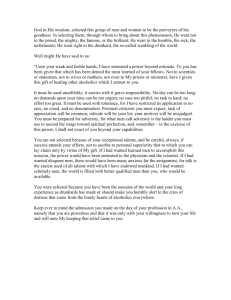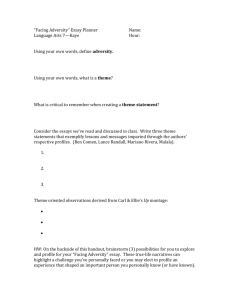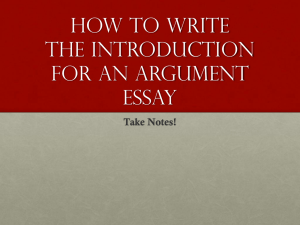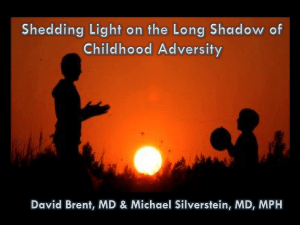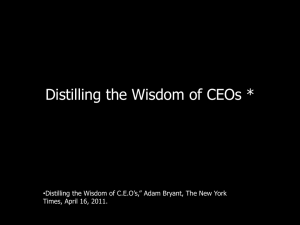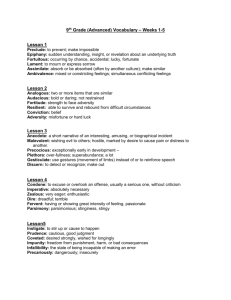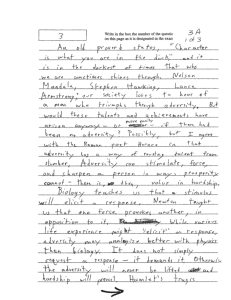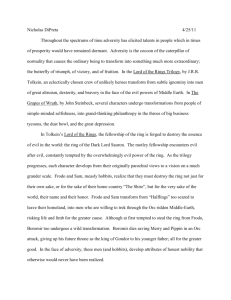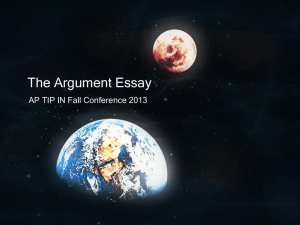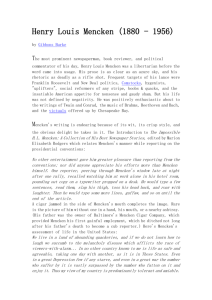ARGUMENT ESSAY AP STUDENT EXAMPLES 2009 Prompt
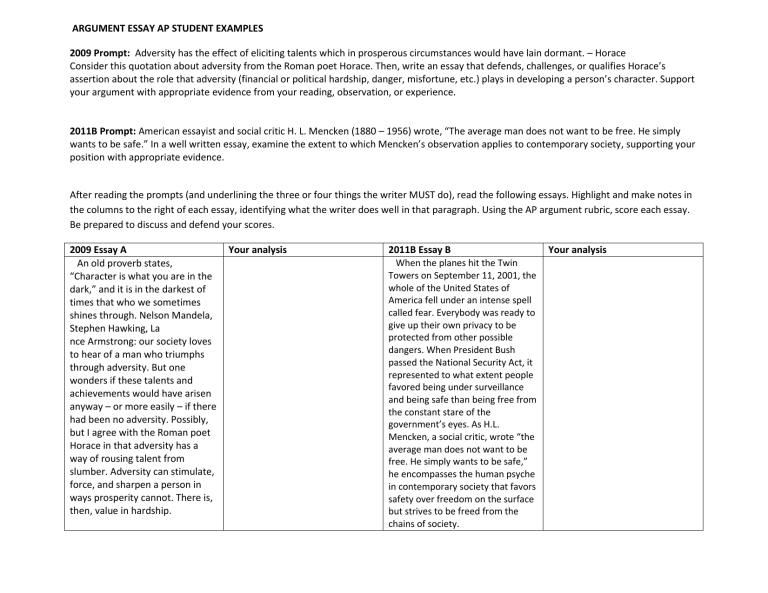
ARGUMENT ESSAY AP STUDENT EXAMPLES
2009 Prompt: Adversity has the effect of eliciting talents which in prosperous circumstances would have lain dormant. – Horace
Consider this quotation about adversity from the Roman poet Horace. Then, write an essay that defends, challenges, or qualifies Horace’s assertion about the role that adversity (financial or political hardship, danger, misfortune, etc.) plays in developing a person’s character. Support your argument with appropriate evidence from your reading, observation, or experience.
2011B Prompt: American essayist and social critic H. L. Mencken (1880 – 1956) wrote, “The average man does not want to be free. He simply wants to be safe.” In a well written essay, examine the extent to which Mencken’s observation applies to contemporary society, supporting your position with appropriate evidence.
After reading the prompts (and underlining the three or four things the writer MUST do), read the following essays. Highlight and make notes in the columns to the right of each essay, identifying what the writer does well in that paragraph. Using the AP argument rubric, score each essay.
Be prepared to discuss and defend your scores.
2009 Essay A
An old proverb states,
“Character is what you are in the dark,” and it is in the darkest of times that who we sometimes shines through. Nelson Mandela,
Stephen Hawking, La nce Armstrong: our society loves to hear of a man who triumphs through adversity. But one wonders if these talents and achievements would have arisen anyway – or more easily – if there had been no adversity. Possibly, but I agree with the Roman poet
Horace in that adversity has a way of rousing talent from slumber. Adversity can stimulate, force, and sharpen a person in ways prosperity cannot. There is, then, value in hardship.
Your analysis 2011B Essay B
When the planes hit the Twin
Towers on September 11, 2001, the whole of the United States of
America fell under an intense spell called fear. Everybody was ready to give up their own privacy to be protected from other possible dangers. When President Bush passed the National Security Act, it represented to what extent people favored being under surveillance and being safe than being free from the constant stare of the government’s eyes. As H.L.
Mencken, a social critic, wrote “the average man does not want to be free. He simply wants to be safe,” he encompasses the human psyche in contemporary society that favors safety over freedom on the surface but strives to be freed from the chains of society.
Your analysis
Biology teaches us that a stimulus will elicit a response.
Newton taught us that one force provokes another, in opposition to it. While various life experiences might “elicit” a response, adversity may analogize better with physics than biology.
It does not simply request a response – it demands it.
Otherwise, the adversity will never be lifted and hardship will prevail. Hamlet’s tragic flaw was indecision, and Shakespeare no doubt understood that those in adversity must learn to be capable of a response if they are to survive.
Survival, of course, is a powerful motivator. Evolution runs on it; in this sense every organism on the planet works due to adversity.
This survival impetus is so powerful; it has been used beyond the biological creatures it is hard-coded into. Computers
Many people rejoice the
“American Dream”: they love the idea that people have equal opportunities to find a job at a company, own a car, get married, have a family, and live in a suburban house. This “Dream” embodies the human nature of wanting to conform and have a safe style of living rather than to live in the way they want. Many work dull office jobs that offer no freedom; however, they’d rather work under an awful boss than be freed from the drudgery of their mediocre lives and have no job. So many people divert to a different path of life from the one they want to walk on because that means taking risks and being “unsafe.” Let me use my father as an example: he spilled to me one night that he dreamed of becoming a pilot and had a choice to become one, however, when the moment came for a final decision, he chose law school instead because it seemed “safer.” I could see the decision he made thirty years ago still haunting him as he wistfully reflected on his life. He chose security over freedom and gave up the life he wanted to live.
However, not everyone favors safety over freedom.
Transcendentalists such as Emerson and Henry David Thoreau sought to break away from society and live under harsh conditions in the wilderness. Once in a long while, certain people start to raise their voices and strive to live in freedom.
now make use of genetic algorithms where competing solutions to a problem – say, the correct shape of an aircraft wing – are selected, mathematically
“bred” and mutated into a new generation. Adversity, it seems, elicits talents more than humans.
Prosperity, on the other hand, does not always engender growth. The prosperous man has no pressing needs or emergencies that require him to develop talents to counter. Brave New
World provides a literary example. The people in this
“utopia” are always fed. They are always happy. There is infinite entertainment, in all imaginable forms. But there is no growth.
When the leader of this society asks an outsider if he truly wants pain, death, and hardship, the
“savage” simply replied, “I claim them all,” and took with him all the good things the “prosperous” lacked – love, family,
Shakespeare, and much more.
Take the Hippie Movement, for example. Young adults, tired of the constricted and corrupt lives society forced them to lead, dropped out of the system and chose freedom. The fact that, every once in a while, people begin to speak out shows that, people, in the deepest part of their psyche, crave freedom and to live the life they want to live. Fear is one thing that oppresses this craving and social propaganda in society is another. Only when anger towards society and the need for freedom surpasses fear and society’s expectations in one’s mind, he or she will choose a path that favors freedom over safety.
When H.L. Mencken made his statement, he was partly right.
People do lead lives that may curb their freedom, but in turn provide them with physical and financial safety. However, under all of the fake contentment pasted on their faces, they wish to break out into the wide open ocean and set sail on an adventure in a sea of opportunities and new discoveries.
In fiction, a character often ends a story realizing far more than he did when he began. The conflicts and resolutions he has been through have forced it on him.
Character development is not merely a literary construct; it exists in life. We cannot live and we cannot grow without the realization that we are not living perfectly and that we have ideals to grow towards, and revealing these is the true value of adversity.
SCORE ________________ SCORE ___________________
In the space below, write three specific things you will take from these essays and apply to your own argument essay.
